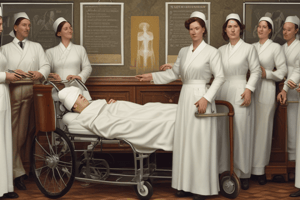Podcast
Questions and Answers
Which theory focuses on the interactions between a system and its environment?
Which theory focuses on the interactions between a system and its environment?
- Chaos theory
- Systems theory (correct)
- Adaptation theory
- Developmental theory
What is a key factor contributing to disparities in healthcare?
What is a key factor contributing to disparities in healthcare?
- Access to healthcare facilities
- Nurse education level
- Geographic location (correct)
- Quality of pharmaceuticals
Which concept emphasizes meeting physiological and safety needs before addressing higher-level needs?
Which concept emphasizes meeting physiological and safety needs before addressing higher-level needs?
- Maslow's hierarchy of needs (correct)
- Evidence-based practice
- Cultural competence
- Nursing research
What distinguishes acute illness from chronic illness?
What distinguishes acute illness from chronic illness?
What guides the ethical practice of nursing?
What guides the ethical practice of nursing?
Which level of preventive care involves screening for early detection and prompt treatment of health problems?
Which level of preventive care involves screening for early detection and prompt treatment of health problems?
What is a key element that influences evidence-based practice in nursing?
What is a key element that influences evidence-based practice in nursing?
In what way do adaptation theory, systems theory, and developmental theory differ?
In what way do adaptation theory, systems theory, and developmental theory differ?
How do nursing organizations contribute to nursing practice?
How do nursing organizations contribute to nursing practice?
Which factor plays a significant role in disparities in healthcare?
Which factor plays a significant role in disparities in healthcare?
How does the role of the nurse as an advocate contribute to patient care?
How does the role of the nurse as an advocate contribute to patient care?
Which statement best describes the levels of preventive care?
Which statement best describes the levels of preventive care?
Flashcards
Nursing Definition
Nursing Definition
Protection, promotion, and optimization of health and abilities; prevention of illness and injury; alleviation of suffering; advocacy in the care of individuals, families, and communities.
Aim of Nursing
Aim of Nursing
To facilitate maximal health and quality of life for patients through high-quality, patient-centered care.
Nursing Process
Nursing Process
A systematic approach to nursing practice that includes assessment, diagnosis, planning, implementation, and evaluation.
Nursing Theories
Nursing Theories
Signup and view all the flashcards
Evidence-Based Practice
Evidence-Based Practice
Signup and view all the flashcards
Acute Illness
Acute Illness
Signup and view all the flashcards
Chronic Illness
Chronic Illness
Signup and view all the flashcards
Cultural Diversity
Cultural Diversity
Signup and view all the flashcards
Cultural Competence
Cultural Competence
Signup and view all the flashcards
Modes of Value Transmission
Modes of Value Transmission
Signup and view all the flashcards
Code of Ethics for Nursing
Code of Ethics for Nursing
Signup and view all the flashcards
Nurse as Advocate
Nurse as Advocate
Signup and view all the flashcards
Study Notes
Historical Background of Nursing
- Nursing has a rich historical background that has evolved over time
- Florence Nightingale is considered the founder of modern nursing
- Nursing has progressed from a vocation to a recognized profession and discipline
Definitions of Nursing
- Nursing is defined as the protection, promotion, and optimization of health and abilities
- It involves prevention of illness and injury, alleviation of suffering, and advocacy in the care of individuals, families, and communities
Status of Nursing as a Profession and Discipline
- Nursing is recognized as a profession and discipline with its own body of knowledge, theories, and practices
- It has its own professional organizations, standards of practice, and code of ethics
Aims of Nursing
- The primary aim of nursing is to facilitate maximal health and quality of life for patients
- This is achieved through the provision of high-quality, patient-centered care
Nursing Organizations, Standards, and Practice Acts
- Nursing organizations, standards of practice, and nurse practice acts influence nursing practice
- They provide guidelines, regulations, and standards for nursing care
Nursing Process
- The nursing process includes assessment, diagnosis, planning, implementation, and evaluation
- It is a systematic approach to nursing practice that ensures comprehensive and individualized care
Current Trends in Nursing
- Current trends in nursing include emphasis on evidence-based practice, technology integration, and interprofessional collaboration
- There is also a focus on addressing healthcare disparities and promoting health equity
Nursing Theories
- Systems theory, adaptation theory, and developmental theory are three main nursing theories
- They provide frameworks for understanding human behavior, health, and illness
Evidence-Based Practice
- Nursing theory and research inform evidence-based practice
- It involves the use of best available evidence to guide nursing practice
Acute and Chronic Illness
- Acute illness is characterized by a sudden onset and short duration
- Chronic illness is characterized by a long duration and persistent symptoms
Health Care Disparities
- Factors contributing to health care disparities include socioeconomic status, race, ethnicity, and access to care
- Nurses play a critical role in addressing these disparities and promoting health equity
Role of the Nurse
- The nurse plays a critical role in promoting health, wellness, and preventing illness
- They also address disparities in health care and advocate for patients' rights
Levels of Preventive Care
- Primary prevention focuses on preventing disease and promoting health
- Secondary prevention focuses on early detection and treatment of disease
- Tertiary prevention focuses on rehabilitation and management of disease
Maslow's Hierarchy
- Maslow's hierarchy includes physiological, safety, love and belonging, esteem, and self-actualization needs
- Nurses must address these needs to provide holistic care
Community Health, Cultural Diversity, and Family Concepts
- Community health focuses on promoting health and well-being in populations
- Cultural diversity refers to the differences in values, beliefs, and practices among cultures
- Family concepts include family roles, structures, functions, and developmental stages
Cultural Competence
- Cultural competence is essential in nursing practice
- It involves understanding and respecting the cultural diversity of patients and their families
Modes of Value Transmission
- Five common modes of value transmission include socialization, education, language, religion, and culture
- These modes shape our values and beliefs
Code of Ethics for Nursing
- The code of ethics for nursing guides nursing practice and decision-making
- It provides a framework for ethical behavior and professional conduct
Nurse as an Advocate
- The nurse plays a critical role as an advocate for patients and their families
- They promote their rights, dignity, and well-being
Studying That Suits You
Use AI to generate personalized quizzes and flashcards to suit your learning preferences.




